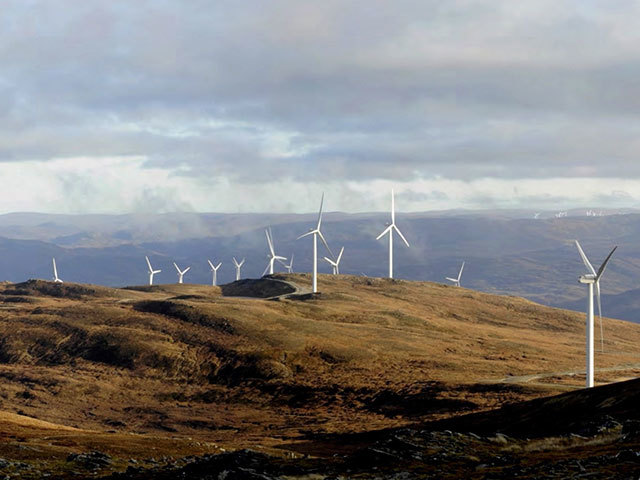
Conservation charity WWF has hailed Scotland’s “wet and windy” summer weather as a “belter” for renewable energy.
The campaigners revealed that the amount of electricity produced by wind turbines was up by more than 50% on last year – and that during just eight days in July, the energy generated was sufficient to meet the needs of every home in Scotland.
It said that wind power alone supplied 660,117.23 Megawatt hours (MWh) of electricity to the National Grid last month, enough to supply the needs of 72% of Scottish homes.
Last night, supporters said the figures proved that Scotland’s renewables industry continues to go from “strength to strength”.
However, opponents demanded to know what happens when it is not windy – and said Scotland cannot rely on such an “intermittent” and “uncontrollable” energy source.
WWF Scotland analysed data on wind and solar power from WeatherEnergy for the month of July, discovering that wind power alone generated more than a third of Scotland’s electricity needs for the month.
The amount of electricity used by homes, businesses and industry totalled 1,856,789.5MWh, with wind power producing 36% of this.
The charity’s Scotland director, Lang Banks, said: “It may have been one of the wettest and windiest months in decades, but July also turned out to be a belter of a month for wind power in Scotland.
“Thanks to a combination of increased capacity and much windier weather, output from turbines was up more than half compared to the same period last year – supplying power equivalent to the electrical needs of 1.75 million homes.”
Despite the wet weather, the charity said there was enough sunshine to allow homes with solar PV panels to generate 94% of the average electricity need in Aberdeen, compared to 87% in Inverness, 85% in Edinburgh and 79% in Glasgow.
Meanwhile for homes which use solar power to heat their water, the sunshine could have generated 92% of an average home’s hot water needs in Aberdeen, compared to 87% in Inverness, 85% in Edinburgh and 74% in Glasgow.
Mr Banks added: “Despite the clouds and overcast skies, for tens of thousands of homes that have installed solar panels to generate electricity or heat water, around four-fifths of their electricity or hot water needs could have been met by the sun.
“This all helped Scotland to further reduce its reliance on polluting fossil fuels during July.”
The data was released as US president Barack Obama moved ahead with even tougher greenhouse gas cuts, aiming to cut carbon dioxide emissions by 32% by 2030 from the 2005 levels.
Mr Banks said he was please Obama was “following Scotland’s lead” and “throwing his weight” behind renewables.
“It sends a very powerful message globally that more politicians need to get right behind green energy,” he said.
“Improving energy efficiency and embracing renewables is what is what is going to take the world one step closer to addressing the challenge of global climate change.”
Recommended for you
